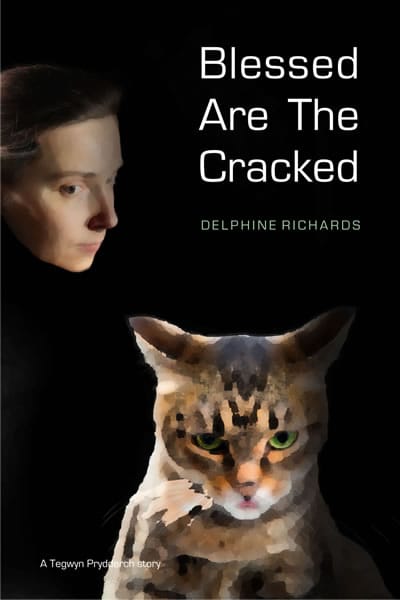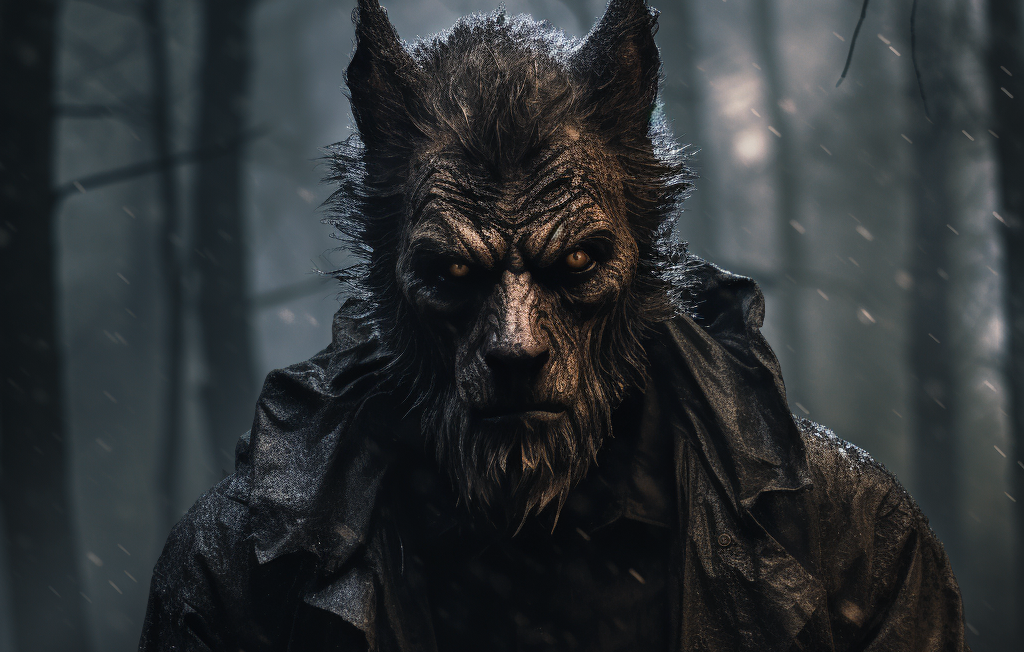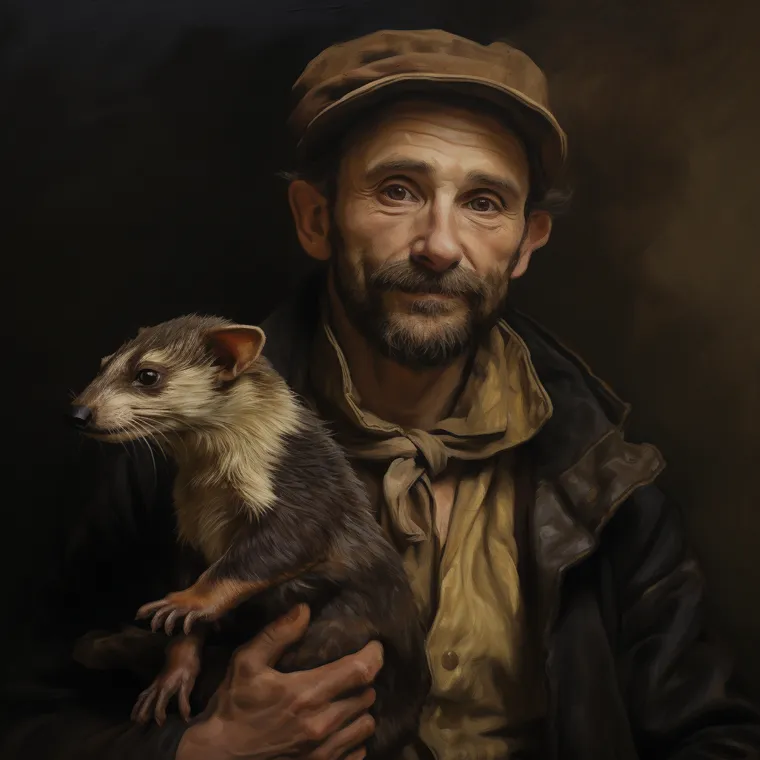A newspaper cutting sticks out of a sheaf of papers. Tegwyn pulls it out. It is the front and back cover of the Llanefa Guardian. His photograph appears on the sports section of the back page under the headline ‘Tegwyn Wins National Police Championships’. Below that is the story of his triumph in the Veterans Squash Tournament. He had never gained such an honour as a non-veteran player, but nevertheless, he looks pleased as he remembers it.
A story from Blessed are the Cracked by Delphine Richards. Donald's Cat the first story in this serialisation is HERE
Listen to the audio version of this episode.
As he folds the paper up, the front page displays its contents.
‘Police Allay Witchcraft Fears’ it reads.
He had forgotten about that. He had not been involved in it. In truth, there had been nothing to be involved in, Tegwyn believed. He had nurtured his own theories at the time, but then the story had faded away and Llanefa life had returned to normal.
Hardly anyone in Llanefa knew what Bara’s real name was. Even Bara himself had to think about it if he was asked. His parents rarely called him by any name; their reluctance to confuse him clashed with their greater unwillingness to call him by a name which was, basically, an insult.
When he was born, after a long and difficult labour, Bara had seemed like an ordinary baby. Or even extraordinary to his parents, who had been childless for years and had resigned themselves to that situation. His arrival was the cause of great celebration in the Thomas household. That the miracle child was also a boy simply compounded the degree of elation felt by the family. In 1974, it was still more desirable to have a boy than a girl.
As the young Iwan Wyn grew beyond the age at which he should be walking and talking, his mother began to suffer some doubts (which she kept to herself for superstitious reasons). Her fears were partly alleviated when her son suddenly discovered the art of walking, but his vocabulary remained in the territory of babyhood.
By the time he was at primary school, it was obvious to everyone that Iwan was ‘not right’. He had been able to communicate by then, but few people were able to understand him.
Much later, experts said he had Learning Difficulties and had called him ’Special Needs’. Everyone else called him Bara.
The origin of the cruel nickname was the old phrase ‘In with the bread, out with the buns’ to describe someone who was ‘half-baked’ – Bara being the Welsh word for bread.
‘What’s your name, bach?’ his mother would sometimes test him.
‘Bara,’ he would say.
‘No, not that name. Your real name – in case you get lost and have to ask a policeman to help you come home.’
He would think for a few seconds before blurting out the answer ‘Iwanwynthomas.’
By the time he was in his last few years at school, everyone had accepted that Bara would never be any different. His brain told him that he would be at his happiest playing with children of around ten years old, but his parents were not happy with that situation. Bara’s mother told him that he was not allowed to play with girls – an order he was happy to comply with. He was only interested in playing with boys. There was nothing he loved more than building mountain-bike ramps and obstacles, making them higher and higher and watching in delight as his young friends courageously flew over them. To his dismay, his mother discouraged him from doing that too. For a while, Bara wandered around where he could see the boys playing, but never went too near.
At around this time, Bara’s mother approached a local man known as ‘Gil the Ferret’. Gil was a man of few words - a long retired council road worker who had always kept ferrets and a lurcher or two. Bara had shown a curious interest in Gil as he pushed his bike past the house. Bara was particularly intrigued by the ferret-box stacked in the front basket and the pair of reddish brown eyes that peered out. From then on, Bara would accompany Gil as he set off to kill vermin for some farmer or trap rabbits to give his neighbours to cook.
By the time he was twenty years old, Bara could kill rats, trap rabbits, track foxes and badgers, but was often not able to tie his own shoelaces. Gil also taught him to catch fish from the Pwll Efa and the much larger Efa Fawr – a highly illegal occupation as neither possessed a fishing licence and the waterways were fiercely guarded by licensed fishermen and the Water Bailiff! When Gil eventually died, Bara was already in possession of his own lurcher (who slept on his bed) and a pair of ferrets (who, by his mother’s decree, slept in a hutch at the furthest point in the garden!).
Bara accepted the death of Gil in his own blank way. Gil was no longer there – that was the end of the matter.
As well as being an excellent catcher of vermin, Bara was built like a wrestler. Llanefa farmers often used him to help them with tasks that involved heavy work – holding cattle to trim their feet or lifting bales into a loft. The pocket money they paid him was dismal, but Bara treated it like a lottery win as he found that he was able to buy his own Mars bars (to which he was addicted).
The way he saw the world meant that Bara was very much a creature of habit – it was the only way he felt truly at ease. His mother had made many rules for him to follow. He was not to play with children (though, in his thirties, he still looked longingly at the boys and their bikes), he was not to hit anyone, he was to wash his hands before he ate anything (or the germs would crawl inside him and kill him, she had said) and there were certain things he was only allowed to do in private. His mother had explained that if he wanted a pee-pee or poo-poo, he had to go to the toilet. If there was no toilet (such as when he was hunting vermin) he had to find a private place where no one could see him. She had added another rule – unless he was going to the toilet or washing himself in the bath, he was not to touch himself on his privates. This was one rule that Bara broke – sometimes he just couldn’t help himself. He didn’t know why he sometimes felt the need to do it, but his fear of his mother’s anger meant that he always made sure he did it in private. Occasionally, she caught him picking his nose or cleaning wax out of his ears and that, too, earned him a telling off. At home, Bara often sat with his huge hands spread out on a table in front of him. That way, he could see them and know that they were not doing anything that would anger his mother!
His parents were ever conscious of the responsibility they had in ensuring that Bara fitted into society. They monitored TV programmes and made sure that he didn’t watch anything that contained sex scenes or violence. They had given up with regards to swearing as Bara’s contact with farmers had resulted in a huge expansion in his swearing vocabulary! What they didn’t realise was that the farmers he worked for often talked among themselves about women and sex scenes they had watched on TV. Bara usually sat and listened in bemused silence. Some of them would bring porn magazines along to the cattle market and cruelly show them to Bara – (‘How would you like to find her in your bedroom, Bara?’ one of them would say. Bara would close his eyes; the graphic images did no more than frighten him.) If, though, he saw a teenage girl dressed in shorts or tight fitting tee-shirt, occasionally he would get a feeling that something was happening to his body and he needed to go somewhere private to deal with it. The sad fact was that Bara’s brain had no idea that his body was thirty-four years old and made him respond to stimuli that would have aroused a thirteen year old boy.
To everyone in Llanefa, Bara was just Bara – harmless, but it was better to leave him alone – just in case.
Bara’s dog was called Jess. It was his second Jess - the first having died at a reasonable old age. He had accepted the death of the first Jess in the same way he had accepted the death of Gil the Ferret. His parents had ensured that the first Jess had been neutered so that they would be spared the problem of unwanted puppies. However, the second Jess had not yet been neutered as she was only fifteen months old and had not yet had her first heat – the marker by which the vet measured the maturity and suitability of dogs needing to be neutered. It was unusual, but not rare for a bitch to be so late having her first heat so Bara’s mother managed to talk the vet into spaying her as soon as she could get a date arranged. She tried to find a way of explaining to Bara that Jess would need to go to the vet for an operation, but each time a possible date was planned, Bara had become stubbornly unwilling to let them take the dog away from him (he had been young enough to accept parental orders when the first Jess had been spayed).
Despite his reputation as a vermin exterminator, Bara was an animal lover. Jess was his constant companion and he also took time to stroke the ears of cats he saw sitting on garden walls. Ponies, too, earned themselves a rub on the nose if they appeared friendly, though he was a little more cautious of larger horses. Due to his contact with farmers, Bara was also aware that animals sometimes had to be killed. He had seen cows with broken legs and dogs who had been run over and who had to be put out of their misery. He was aware, too, that dogs who were caught worrying sheep had to be shot. His limited understanding accepted this as normal life.

Blessed are the Cracked
This interconnected collection of five novellas and two short stories from the casebook of retired local policeman Tegwyn Prydderch, is set in the fictional West Wales farming community of Llanefa. Delphine Richards’s dark tone dealing with traumatic issues of life and crime paints a shockingly different picture of life in rural West Wales.





